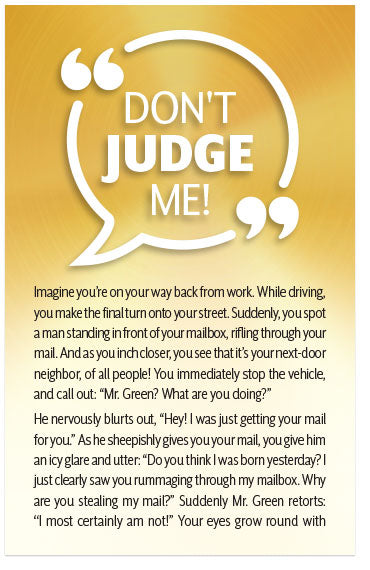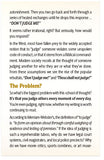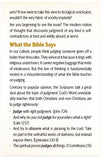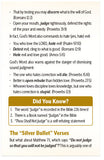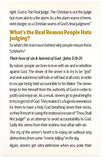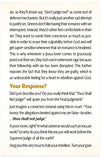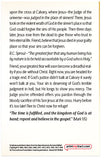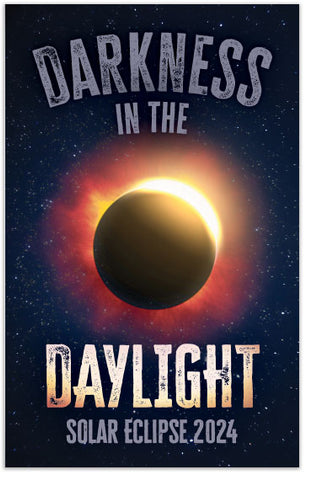Don't Judge Me!
Special-Order Folded Tract
 NOTE: This item is custom-printed to order (click for more details).
NOTE: This item is custom-printed to order (click for more details).
This tract is from our print-on-demand library, and is not kept in stock. Select the options below, and we will custom-print a batch just for you. Because this item is custom-printed, you can add your custom imprint to the back page at no extra cost.
- Estimated shipping date: Monday, March 16 (Click for more details)
- SKU:
- Discounts: Discount coupons do not apply to this item
- Format: Folded Tract
- Size: 3.5 inches x 5.5 inches
- Pages: 8
- Imprinting: Available with 3 lines of custom text
- Version: NASB
- Returns: Because this item is custom-printed to order, it cannot be returned.
Show all item details
The full text of this tract is shown below in the NASB version. (Do you want to print this tract in a different version than the one listed? Contact us and let us know what you're looking for—we may be able to create the alternate version for you at no charge.)
Imagine you’re on your way back from work. While driving, you make the final turn onto your street. Suddenly, you spot a man standing in front of your mailbox, rifling through your mail. And as you inch closer, you see that it’s your next-door neighbor, of all people! You immediately stop the vehicle, and call out: “Mr. Green? What are you doing?”
He nervously blurts out, “Hey! I was just getting your mail for you.” As he sheepishly gives you your mail, you give him an icy glare and utter: “Do you think I was born yesterday? I just clearly saw you rummaging through my mailbox. Why are you stealing my mail?” Suddenly Mr. Green retorts: “I most certainly am not!” Your eyes grow round with astonishment. Then you two go back and forth through a series of heated exchanges until he drops this response … “DON’T JUDGE ME!”
It seems rather irrational, right? But seriously, how would you respond?
In the West, most have fallen prey to the widely accepted notion that to “judge” someone violates some unspoken code of conduct, or that it stems from a Biblical commandment. Modern society recoils at the thought of someone judging another for who they are or what they’ve done. From these assumptions we see the rise of the popular rebuttals, “Don’t judge me!” and “Thou shall not judge!”
The Problem?
So what’s the biggest problem with this school of thought? It’s that you judge others every moment of every day. You’re even judging, right now, whether my writing is worth continuing to read.
According to Merriam-Webster’s, the definition of “to judge” is: “to form an opinion about through careful weighing of evidence and testing of premises.” If the idea of judging is such a reprehensible taboo, why do we have legal court systems, civil magistrates, and local police precincts? Why do we have movie critics, sports combines, or art museums? If one were to take this view to its logical conclusion, wouldn’t the very fabric of society implode?
Are you beginning to see the issue? The modern notion of thought that discounts judgment of any kind is self-contradictory at best and wildly absurd at worst.
What the Bible Says
In our culture, people think judging someone gives off a holier-than-thou vibe. They wince at it because it rings with religious undertones. It carries negative baggage that reeks of intolerance. But this line of thinking is fundamentally rooted in a misunderstanding of what the Bible teaches on judging.
Contrary to popular opinion, the Scriptures talk a great deal about the topic of judgment. God’s Word unmistakably teaches that both Christians and non-Christians are to judge righteously:
• Judge with right judgment. (John 7:24)
• And why do you not judge for yourselves what is right? (Luke 12:57)
• And try to discern what is pleasing to the Lord. Take no part in the unfruitful works of darkness, but instead expose them. (Ephesians 5:10-11)
• The spiritual person judges all things. (1 Corinthians 2:15)
• That by testing you may discern what is the will of God. (Romans 12:2)
• Open your mouth, judge righteously, defend the rights of the poor and needy. (Proverbs 31:9)
In fact, God’s Word also commands to hate (yes, hate) evil:
• You who love the LORD, hate evil! (Psalm 97:10)
• Detest evil; cling to what is good. (Romans 12:9)
• Hate evil and love good. (Amos 5:15)
God’s Word also warns against the danger of dismissing sound judgment:
• The one who hates correction will die. (Proverbs 15:10)
• Better is open rebuke than hidden love. (Proverbs 27:5)
• Whoever loves discipline loves knowledge, but one who hates correction is stupid. (Proverbs 12:1)
Did You Know?
1. The word “judge” is recorded in the Bible 226 times!
2. There is a Book named “Judges” in the Bible
3. “Thou Shall Not Judge” is a self-refuting statement
The “Silver Bullet” Verses
But what about Matthew 7:1, which says: “Do not judge so that you will not be judged”? This is arguably one of the most misused and abused verses in the entire Bible. Most people will try and deploy this verse without even the slightest care to its context. But if you keep reading the following verses, you see that Jesus is speaking about hypocritical judgment. Pointing out sin in someone while you yourself are drowning in that same sin is what Jesus condemns here. In fact, just a few sentences later in Matthew 7:5, Jesus encourages judging others so you can “take the speck out of your brother’s eye”!
Another classic trophy verse that people also rip out of context is John 8:7, which says: the one “who is without sin among you, let him be the first to throw a stone.” People blurt out this verse as a defense mechanism, as if Jesus is forbidding all non-perfect people from judging, or as if Jesus is okay with sin. Well, Jesus clearly isn’t forbidding people from judging because He commands people to judge in the Bible verses we already listed!
And Jesus is not okay with sin—again, this is a failure to read the text in its context. You’ll notice at the end of the passage in John 8:11, Jesus says: “Go. From now on sin no more.” This implies that Jesus is definitely not condoning her sin.
Lastly, you’ll hear the smokescreen “Only God can judge me” argument thrown around. To which we respond, “You’re right. God is The Final Judge. The Christian is not the Judge but more akin to a fire alarm. As a fire alarm warns of imminent danger, so a Christian warns of God’s final judgment.”
What’s the Real Reason People Hate Judging?
So what’s the real reason behind why people misuse these Scriptures?
Their love of sin & hatred of God. (John 3:19-21)
By nature, people are born in love with sin and in rebellion against God. The desire of the sinner is to try to be “god” and seek autonomy (self-rule or self-law) at all costs, in order to escape being held accountable to his Maker. The sinner longs to free himself from the authority of God in order to justify and enjoy sin. As a result, sinners go to great lengths to try to get rid of God. They realize it’s a huge inconvenience for them to have a Holy God breathing down their necks, so they’ll resort to using the irrational excuse of “Thou Shall Not Judge!” as an attempt to avoid accountability to God. Sadly this stems from their reckless love affair with sin.
The cry of the sinner’s heart is to enjoy sin without any distractions from some “cosmic killjoy” in the sky.
Again, sinners get ultra-defensive when you poke their sin, so they’ll shout out, “don’t judge me!” as some sort of defense mechanism. But it’s really just another sad attempt to justify sin. Sinners don’t like having their romance with sin interrupted. Instead, they’d rather feel comfortable in their sin. They want to numb their conscience as much as possible in order to erase their culpability before God and will get super-sensitive whenever that sin-romance is hindered. This is why whenever a Jesus-lover comes to graciously point out their sin, they lash out in vehement rage because their fellowship with sin has been disrupted. This further exposes the fact that they know they are guilty, which is an unbearable feeling for a heart in rebellion against God.
Your Response?
Did I just describe you? Do you really think that “Thou Shall Not Judge!” will spare you from the Final Judgment?
Just imagine a convicted criminal using this in court: “Your honor, the allegations leveled against me are false—besides … thou shall not judge.”
A poor move, right? In what universe would such an excuse work? So why do you think this excuse will work before the Supreme Judge of all the earth?
I beg you this very hour to halt your rebellion. Turn your gaze upon the cross at Calvary, where Jesus—the Judge of the universe—was judged in the place of sinners! There, Jesus took on the violent wrath of God in the sinner’s place so that God could forgive the sins of His people. Then three days later, Jesus rose from the dead to give those who trust in him eternal life. Friend, believe that Jesus died in your guilty place so that your sins can be forgiven.
R.C. Sproul ~ “The greatest fear that any human being has by nature is to be held accountable by a God who is Holy.”
Friend, your greatest fear will soon become a dreadful reality if you die without Christ. Right now, you are headed for a tragic end. If God’s justice didn’t balk at Calvary it surely won’t balk at you. Your sin is deserving of God’s terrible judgment in hell, but He longs to show you mercy. The Judge you’ve offended offers you pardon through the bloody sacrifice of His Son Jesus at the cross. Hurry before it’s too late! Flee to Christ now for refuge!
“The time is fulfilled, and the kingdom of God is at hand; repent and believe in the gospel.” (Mark 1:15)

